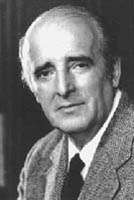Robert Laxalt
| Robert Laxalt | |
|---|---|
 | |
| Born |
September 25, 1923 Alturas, California, United States |
| Died |
March 23, 2001 (aged 77) Reno, Nevada, US |
| Nationality | American |
| Ethnicity | Basque-American |
| Occupation | writer |
| Employer | University of Nevada, Reno |
| Spouse(s) | Joyce Nielsen Laxalt |
| Children | 3 (Bruce, Monique, and Kristin)[1] |
Robert Laxalt (September 25, 1923 – March 23, 2001)[2] was a Basque-American writer from Nevada.[3]
Biography
Sweet Promised Land (1957), Laxalt's first and possibly best-known book, was based on the history of his father, Dominique, and his return to the homeland after forty-seven years as an immigrant sheepherder in Nevada.[4][5] This book was especially well received in the ranching areas of Nevada and adjacent states, and led to creation of several "Basque Festivals" in those areas. Laxalt also served as a consultant to the Library of Congress on Basque culture, and helped start the Basque Studies program at the University of Nevada.
Robert was the younger brother of Paul Laxalt,who served as Nevada governor (1967–1971) and U.S. Senator (1974–1987). Sweet Promised Land's local popularity likely played a role in his brother Paul's early political victories.
Robert Laxalt founded the University of Nevada Press, which published almost all of his books written after 1964. This raised the prominence of the University of Nevada Press, but also limited the distribution and probably the critical attention given to Robert's books. He also served as the writer-in-residence at the University of Nevada Reno, and in 1988 became the first occupant of the Distinguished Nevada Author Chair at that university.
Laxalt was chosen along with Walter Van Tilburg Clark to be the first writer inducted into the Nevada Writers Hall of Fame when it was established in 1988 by the Friends of the University of Nevada Libraries.[6]
Basque identity
From the Basque Oral History Project:[7]
- Laxalt brought Basque identity to the forefront of those living in the Western States. Born on a livestock ranch during the Great Depression, he saw his father went out on the road doing whatever he could to make a living cause the depression. His mother heard that there was a Basque hotel in Carson City for sale called the French Hotel. The business went pretty well and even during Prohibition the hotels served wine. The clientele were more American than Basque. The politicians took a liking to Paul at the time, said he'd be governor some day. Eventually his father bought some ewes again and started buying private land so he would be able to run his sheep. He never wanted to be big again, because it was too risky.In the hotel there were also many miners, prospectors and buckaroos. In town, the Basques would wear their best suits every day. His father almost went crazy staying in the hotel, wanted to be outside in the mountains running sheep and cattle.
- They knew most of the other families in the area, would travel around all the time. His father had only one American sheepherder, but he lost sheep. The significance of the Basque hotels were that they were a home away from home for the sheepherders, where they could speak Basque, play cards and have good food. About the herders, what they did and how they felt about their lifestyle. Who were the best sheepherders according to someone, scots and irishmen but the Basques would always stay with the sheep and never leave them.
Books by Robert Laxalt
- The Violent Land: Tales the Old Timers Tell, 1950
- Sweet Promised Land, 1957
- A Man in the Wheatfield, 1964. Selected by the American Library Association as one of the six notable works of American fiction that year.
- Nevada, 1971
- In a Hundred Graves: A Basque Portrait, 1972
- Nevada: A Bicentennial History, 1977
- A Cup of Tea in Pamplona, 1985. Nominated for a 1985 Pulitzer Prize in fiction.
- A Basque Hotel, 1989. Nominated for a Pulitzer Prize.
- A Time We Knew: Images of Yesterday in the Basque Homeland, 1990
- The Child of the Holy Ghost, 1992
- A Lean Year and Other Stories, (16 short stories), 1994
- The Governor's Mansion, 1994
- Dust Devils, 1997
- A Private War: An American Code Officer in the Belgian Congo, 1998
- The Land of My Fathers: A Son's Return to the Basque Country, 1999
- Time of the Rabies, 2000
- Travels With My Royal: A Memoir of the Writing Life, available in May 2001.
References
- ↑ "An Inventory of the Robert Laxalt Papers Collection No. 85-09". unr.edu. Retrieved 29 September 2015.
- ↑ http://www.knowledgecenter.unr.edu/specoll/mss/85-09.html
- ↑ Rio, David."Robert Laxalt: A Basque Pioneer in the American Literary West" (Adobe Acrobat *.PDF document)
- ↑ "Stories of Sheep People: Herders & Carvers" @ University of Nevada, Reno Libraries
- ↑ "50th Anniversary of Robert Laxalt's Sweet Promised Land" @ the North American Basque Organizations Website
- ↑ Nevada Writers Hall of Fame
- ↑ Robert Laxalt page @ University of Nevada, Reno – Center for Basque Studies site
External links
- Robert Laxalt at Find a Grave
- Center for Basque Studies: Robert Laxalt
- "Robert Laxalt: A Basque Pioneer in the American Literary West" (Adobe Acrobat *.PDF document) by David Rio
- Obituary in the Las Vegas Review-Journal
- Nevada Writers Hall of Fame
|